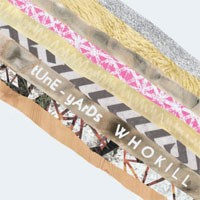Tune-Yards
W H O K I L L

- Record Label
- 4AD
About this item
"w h o k i l l", the sophomore album by Merrill Garbus’ tUnE-yArDs, is a thrill for fans of the live show that left most stunned in 2010. No longer is her artful songwriting and soulful voice obscured by digital fuzz as it often was on her solo debut, "BiRd-BrAiNs". Transplanting herself from Montreal to sunny Oakland, California, while touring almost non-stop for over two years, Merrill has stripped tune-yards away to a more precise, concentrated and vivid sound. "w h o k i l l" retains the honesty of the lonely bedroom confessional characteristic of her early work, but with the addition of the fangs, claws and dented metal of its new surroundings.
As before, tUnE-yArDs grounds its sound in tangible, instantly gratifying techniques. Neither digital magic trickery nor auto-tuned dazzle need be applied; tUnE-yArDs’ music is made by human hands and possessed of a distinctly human touch. This is music created piecemeal, smashed apart wholly, then reassembled tenderly, gaining complexity as the layers stack up.
Applying the tune-yards live approach to her studio work for the first time in "w h o k i l l", her tools have not changed. Rather, she’s added more buttons and joints to those already being used - one essential new joint is dexterous bass member Nate Brenner, who co-wrote a few songs. The opportunities exploited are evident in "w h o k i l l"’s dynamic range, as it matches Garbus’ creative strides. There’s no substitute for a good microphone, and the sonic nuances that can only be achieved through masterful recording techniques — producer Garbus and engineer Eli Crews are to be thanked — can be heard in each drumbeat and vocal line. Take "Powa", a song whose immense, undulating strength emanates from little more than a repeating ukulele line, artfully-placed bass and percussive backbeat, complimented by Garbus’ soaring and melodic vocal delivery.
And can we take a second to thank the good Lord above for giving us a voice like Garbus? From a croon to a shriek to a rap to a hum, the vocal gymnastics of tune-yards’ songs remain front and center. Now, add a beat, one full of soul and swing and wonderful imperfection. That voice infiltrates your mind, shoots down your legs and converts any ground into a dance floor. "Bizness" takes this approach to the extreme, starting with the sung imitation of a xylophone roll, then building in a raucous style until the searing and commanding chorus takes control.
Yet it would vastly underplay "w h o k i l l" to view it as simply a get-your-groove-on party-bringer. Take for example "Doorstep", which melts the usually blasting tune-yards style into a stunning and smooth doo-wop R&B. Then there’s the environment in which it was conceived: Oakland’s particular landscapes serve as primer for what you hear on the album. The city’s unique vitality, a nest of vibrancy and danger, is what fuels the brightness of "w h o k i l l". The sound scraps and samples that characterized "BiRd-BrAiNs" remain as well, placing Merrill on the very soil where these songs grew to full size.
So here we have it. A remarkable record, from a creative force so strong and focused, "w h o k i l l" practically jumps out of its shoes.
